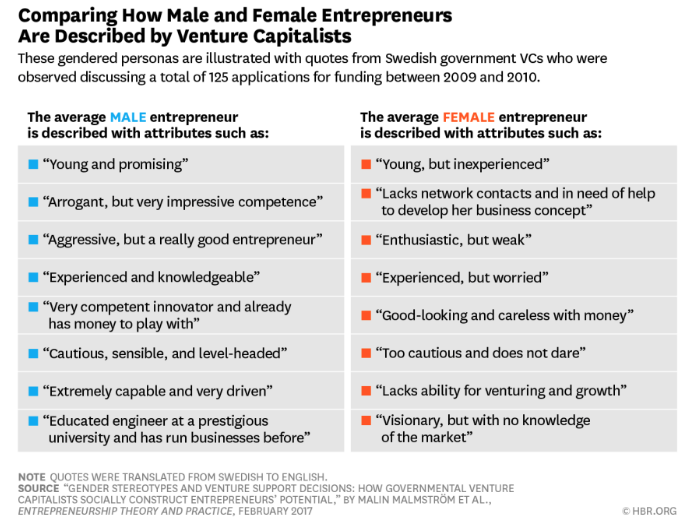A new report from Harvard Business Review looked at Venture Capitalism and the language VC’s use when they speak with female entrepreneurs about funding versus how they speak with men.
In our analyses of these conversations, we looked at how entrepreneurial potential was expressed and how the financiers referred to men and women generally. We identified words and sentences used to describe the entrepreneurs, comments on appearance and dress, and the general dynamics in the decision dialogues and rhetoric.
Aside from a few exceptions, the financiers rhetorically produce stereotypical images of women as having qualities opposite to those considered important to being an entrepreneur, with VCs questioning their credibility, trustworthiness, experience, and knowledge.
We asked Sophia Renmar, of Hera Hub Sweden, her thoughts on the findings:
“From your and other parts of the world we’re considered a really equal country/society and in several ways we are. But regarding this particular factor we still have a long way to go. One of my friends was a co-writer on a report loosely translated into English as Heroic Men and Well Prepared Women. The report argues that the traditional norm for how an entrepreneur is described is using traits associated with men: fearlessness, risk taking, decisiveness and so on.vWhen women show different sets of features like wanting to seek mentors, collaborate or gather information, they are considered weak!”
Sophia’s observations are backed up by the Harvard Review as illustrated by the graphic below.
Another thing Sophia found after speaking with investors in Sweden centers around money:
“I’ve confirmed from several investors and incubators that when women apply for capital, they differ from men [in that] women tend to be so much more prepared, have done so much more [in terms of] market assessment and pre-studies, BUT STILL they ask for a lot less money than men! Men tend to be more skilled in talking about all the things they have done and seem more confident and certain about their offering. Yet, it seems many times, they have not done the same level of preparations as women, but they ask for a lot of more money and many value their companies higher than they are. Whilst women tend to value their companies lower.”
Felena and Sophia sat down to talk about this issue further and established why it’s so important for female entrepreneurs to have a space of their own.






